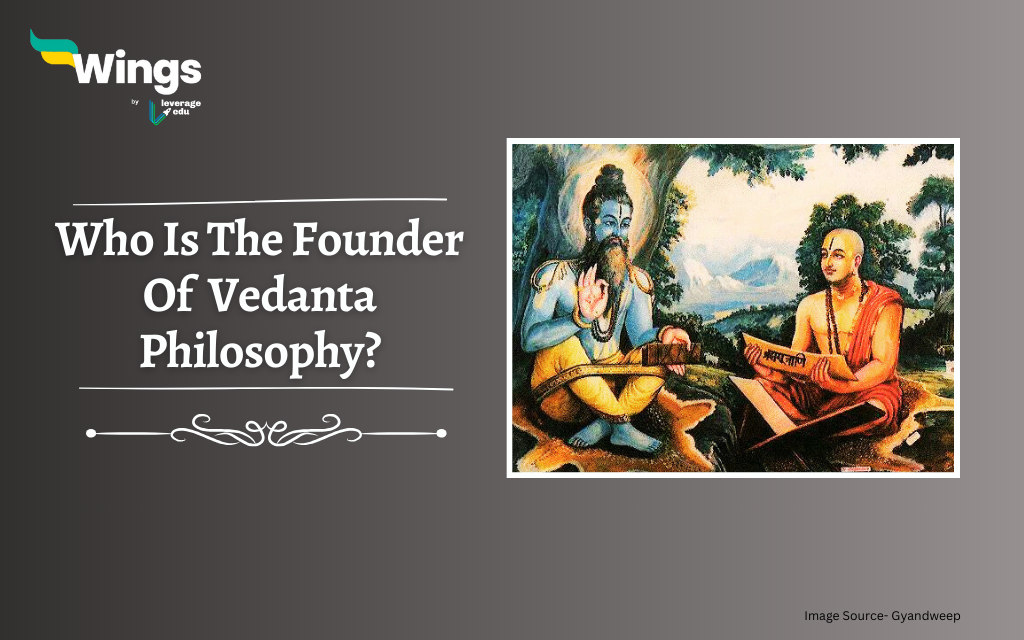Vedanta philosophy is one of the oldest schools of thought that focuses on the metaphysical nature of reality and the self. The Vedanta Sutras by Badarayana (popularly known as Sage Vyasa) is considered to be the first organised study of Vedanta philosophy. However, some scholars suggest that there may have been prior teachers mentioned by Badarayana himself. In this blog, we will try to answer who is the founder of Vedanta philosophy.
Founding Fathers of Vedanta Philosophy
Here are some founding fathers and important personalities who helped in building the blocks of Vedanta Philosophy in India. They are –
- Sage Veda Vyasa or Badarayana – One of the founding fathers associated with the Vedanta philosophy is Sage Vyasa. Also known as Krishna Dvaipayana Vyasa, he is revered as the author of the Mahabharata, the Bhagavad Gita and the Brahma Sutras (which are foundational texts of Vedanta philosophy that explain the teachings of the Upanishads).
- Vedanta philosophy traces its roots back to Sage Vyasa, who is believed to be the compiler of the Vedas, the oldest sacred texts of Hinduism.
- Sage Vyasa is considered the compiler of the Vedas, the ancient sacred texts of Hinduism.
- His teachings and insights laid the foundation for the Vedanta philosophy, which focuses on the ultimate reality and the relationship between the individual soul (Atman) and the universal soul (Brahman).
- Adi Shankaracharya –
- Adi Shankaracharya is considered another founder father in the development of Vedanta philosophy.
- He lived in the 8th century AD and is known for his commentaries on the Vedas and the Upanishads.
- Shankaracharya’s teachings emphasize the non-dualistic nature of reality, stating that the individual self (Atman) is ultimately identical to the supreme reality (Brahman).
Also Read – Adi Shankaracharya: Life, Work, Philosophy and Contribution
- Ramanujacharya –
- Ramanuja, a philosopher who lived in the 11th century AD, is another key figure in the Vedanta tradition.
- He developed the philosophy of Vishishtadvaita, which means qualified non-dualism.
- Ramanuja’s teachings focus on the relationship between the individual soul and the supreme soul, asserting that while they are ultimately one, there are distinctions between them.
- He is also called one of the pioneers in spreading the Bhakti Movement in India.
Also Read – Saint Ramanujacharya: Life, Philosophy, Works
- Swami Vivekananda –
- Swami Vivekananda, a disciple of Sri Ramakrishna, played a crucial role in popularizing Vedanta philosophy in the West during the late 19th century.
- Vivekananda’s teachings on Vedanta emphasized the universality of religion and the unity of all beings, presenting Vedanta as a practical philosophy for spiritual transformation.
There are many other important figures that helped in spreading the Vedanta philosophy in India like Goswami Tulsidas, Madhvacharya, Saint Nimbarka, Meerabai, etc.
FAQs
Vedanta is based on the teachings of the Upanishads, which are the concluding part of the Vedas. The term “Vedanta” itself means “end of the Vedas,” indicating its foundation in the spiritual insights of these ancient texts.
Adi Shankaracharya consolidated the Advaita Vedanta school, emphasizing the idea that the individual soul (Atman) and the ultimate reality (Brahman) are one. He traveled widely, wrote commentaries, and established monastic centers to spread this philosophy.
Yes, Vedanta includes several schools of thought. Besides Advaita Vedanta by Adi Shankaracharya, there is Vishishtadvaita (qualified non-dualism) by Ramanujacharya and Dvaita (dualism) by Madhvacharya, each offering different interpretations of the relationship between the soul and God.
Vedanta is one of the most influential schools of Indian philosophy. It addresses fundamental questions about existence, consciousness, and the ultimate reality, and continues to shape spiritual practices and philosophical thought in Hinduism today.
Relevant Blogs
| Difference Between Nayanars and Alvars | Gurukul Education System in Ancient India |
| Chaitanya Mahaprabhu | Sufi Movement |
| Raja Ram Mohan Roy | Main Branches of Philosophy |
| Difference Between Ramayana and Ramcharitmanas | Gautam Buddha |
That’s all about who is the founder of Vedanta philosophy! If you want to know more about topics like this, then visit our general knowledge page! Alternatively, you can also read our blog on general knowledge for competitive exams!


 One app for all your study abroad needs
One app for all your study abroad needs












 60,000+ students trusted us with their dreams. Take the first step today!
60,000+ students trusted us with their dreams. Take the first step today!